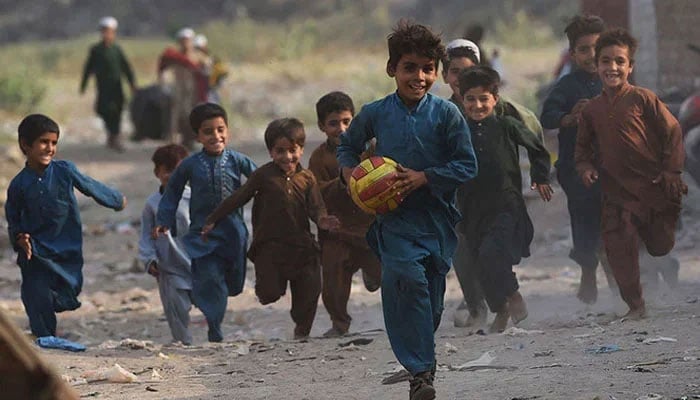Economic Survey raises alarm on millions of out-of-school children
Islamabad:The latest Economic Survey of Pakistan (ESP) has painted a troubling picture of the state of education, revealing that millions of children, especially girls, are still being left behind as classrooms sit empty across the country.
According to the ESP 2024-25 released here on Monday, a staggering 38 per cent of children across the country are out of school—a figure that rings alarm bells for the nation’s future.
Girls are disproportionately affected, with higher rates of exclusion than boys in every province. Balochistan fares the worst, with nearly seven in ten children (69 per cent) missing out on education. Sindh follows at 47 per cent, while Punjab and Khyber Pakhtunkhwa report 32 per cent and 30 per cent of children out of school, respectively.
The gender gap is consistent across all provinces, with more girls out of classrooms than boys—highlighting a pressing need for targeted interventions to ensure every child’s right to education is upheld.
The ESP also revealed that since 2019-20, Pakistan Bureau of Statistics had yet to release the Pakistan Social and Living Standards Measurement Survey, and the Labour Force Survey hadn’t been updated since 2020-21, so literacy figures were based on the 2023 Population and Housing Census.
The census pegs Pakistan’s overall literacy rate at 60.65 percent, with male literacy at 68.0 per cent—substantially higher than the 52.84 per cent for females.
Notably, for the first time, the census also reported literacy among transgender individuals, standing at 40.15 per cent. Urban literacy levels (74.09 per cent) significantly outpace the rural average (51.56 per cent), underlining the persistent education gap between city and countryside. The gap is even starker for women than for men or transgender people.
Among the provinces, Punjab leads in literacy rates with 66.25 per cent, followed by Sindh (57.54 per cent), Khyber Pakhtunkhwa (51.09 per cent) and Balochistan (42.01 per cent).
The latest data on education, based on the 2019-20 Pakistan Social and Living Standards Measurement (PSLM) Survey, highlights lingering challenges despite some improvements. With no recent PSLM survey released, gross and net enrolment rates (GER and NER) in primary, middle, and matric levels remain drawn from outdated figures.
Overall, gross enrolment rates stand at 84 per cent for primary, 63 per cent for middle, and 57 per cent for matric. Males continue to outperform females at all levels, with Punjab leading the pack in GER and Balochistan lagging behind. Net enrolment rates tell a similar story: 64 per cent at the primary level, 37 per cent at middle, and a worrying 27 per cent at matric. Boys dominate in primary and middle education across provinces—except in Punjab, where girls have higher rates at the matric level.
Though the quality of education is closely linked to infrastructure, Pakistan still struggles to provide essential facilities in many schools. While 67 per cent of schools nationwide have electricity, stark provincial disparities persist, with Punjab and Islamabad faring better than Balochistan. Clean water access is also uneven: Punjab and Islamabad lead again, but Balochistan and Azad Jammu and Kashmir face severe gaps, with only 23 per cent coverage. Toilet facilities follow a similar pattern—Punjab, Khyber Pakhtunkhwa and Islamabad show better access, while Balochistan remains well below the mark with just 40 per cent of primary schools equipped. The presence of boundary walls, critical for security, is moderate overall, with Punjab and KP again ahead of the curve.
With 38 per cent of children still out of the classroom and rural areas particularly hard hit, the ESP call for substantial investments and policy reforms. According to it, expanding access, ensuring quality and promoting equity are the building blocks for a stronger, more resilient Pakistan—one where every child has the opportunity to learn, thrive and contribute to national prosperity.
-
 'Star Wars' Director Speaks Out Against 'scared' Comment
'Star Wars' Director Speaks Out Against 'scared' Comment -
 Andrew Mountbatten Windsor Braves Through 'element Of Tragedy' Im Exile
Andrew Mountbatten Windsor Braves Through 'element Of Tragedy' Im Exile -
 Wayne Brady On How Decision About His Sexuality Has Made Him A Better Parent
Wayne Brady On How Decision About His Sexuality Has Made Him A Better Parent -
 Andrew Mountbatten Windsor, Sarah Ferguson To Jump At 'comeback' Chance
Andrew Mountbatten Windsor, Sarah Ferguson To Jump At 'comeback' Chance -
 Prince William, Kate Middleton Have Reset Their 'love' After Cancer
Prince William, Kate Middleton Have Reset Their 'love' After Cancer -
 Prince William, Meghan Markle Make Parallel PR Moves
Prince William, Meghan Markle Make Parallel PR Moves -
 Spencer Pratt Recalls Meeting Ryan Gosling Before Fame
Spencer Pratt Recalls Meeting Ryan Gosling Before Fame -
 Meghan Markle's As Ever Facing Branding Problems?
Meghan Markle's As Ever Facing Branding Problems? -
 Kate Middleton Is More Relaxed In 'Wellington Boots Than Diamond Tiara'
Kate Middleton Is More Relaxed In 'Wellington Boots Than Diamond Tiara' -
 Gaten Matarazzo Addresses Important Fans Query About 'Stranger Things'
Gaten Matarazzo Addresses Important Fans Query About 'Stranger Things' -
 Prince William's Latest Move Reveals Rift Is Strong With Prince Harry
Prince William's Latest Move Reveals Rift Is Strong With Prince Harry -
 Princess Eugenie Becomes Second Royal After Meghan To Feature In Viral Trend
Princess Eugenie Becomes Second Royal After Meghan To Feature In Viral Trend -
 Carol Burnett Sings Praises Of Late Jimmy Stewart: 'He Had THIS'
Carol Burnett Sings Praises Of Late Jimmy Stewart: 'He Had THIS' -
 Kate Middleton Dashes Through Rain At Windsor Castle
Kate Middleton Dashes Through Rain At Windsor Castle -
 Dave Filoni, Who Oversaw Pedro Pascal's 'The Mandalorian' Named President Of 'Star Wars' Studio Lucasfilm
Dave Filoni, Who Oversaw Pedro Pascal's 'The Mandalorian' Named President Of 'Star Wars' Studio Lucasfilm -
 Is Sean Penn Dating A Guy?
Is Sean Penn Dating A Guy?




